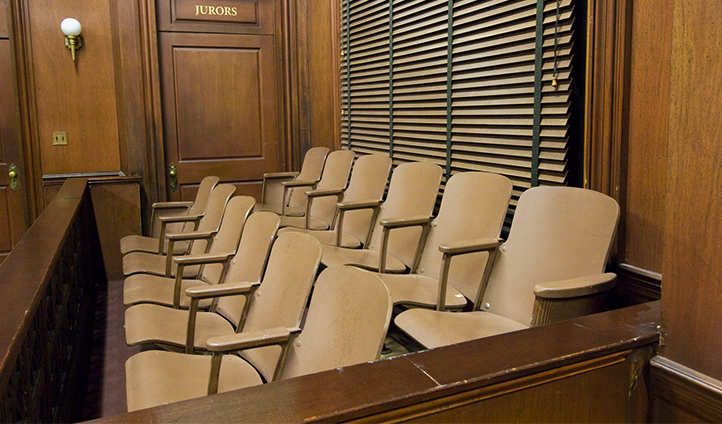Flowers v Mississippi: Jury Selection in Death Row Inmate’s Case Was Unconstitutional

In Flowers v Mississippi, 588 U. S. ____ (2019), the U.S. Supreme Court held that the jury selection process in Curtis Flowers’ sixth murder trial violated the U.S. Constitution. By a vote of 7-2, the Court found that the trial court committed clear error in concluding that the state’s peremptory strike of a particular black prospective juror was not motivated in substantial part by discriminatory intent.
Facts of Flowers v Mississippi
Petitioner Curtis Flowers has been tried six separate times for the murder of four employees of a Mississippi furniture store. Flowers is black; three of the four victims were white. At the first two trials, the State used its peremptory strikes on all of the qualified black prospective jurors. In each case, the jury convicted Flowers and sentenced him to death, but the convictions were later reversed by the Mississippi Supreme Court based on prosecutorial misconduct.
At the third trial, the State used all of its 15 peremptory strikes against black prospective jurors, and the jury convicted Flowers and sentenced him to death. The Mississippi Supreme Court reversed again, this time concluding that the State violated Batson v. Kentucky, 476 U.S. 79 (1976), in which the Supreme Court ruled that a State may not discriminate on the basis of race when exercising peremptory challenges against prospective jurors in a criminal trial. Under Batson, once a prima facie case of discrimination has been shown by a defendant, the State must provide race-neutral reasons for its peremptory strikes. The trial judge then must determine whether the prosecutor’s stated reasons were the actual reasons or instead were a pretext for discrimination.
Flowers’ fourth and fifth trials ended in mistrials. At the fourth, the State exercised 11 peremptory strikes—all against black prospective jurors. No available racial information exists about the prospective jurors in the fifth trial. At the sixth trial, the State exercised six peremptory strikes—five against black prospective jurors, allowing one black juror to be seated. Flowers again raised a Batson claim, but the trial court concluded that the State had offered race-neutral reasons for each of the five peremptory strikes.
The jury convicted Flowers and sentenced him to death. The Mississippi Supreme Court affirmed. After this Court vacated that judgment and remanded in light of Foster v. Chatman, 578 U. S. ___ (2016), the Mississippi Supreme Court again upheld Flowers’ conviction in a divided 5 to 4 decision. Three justices dissented on the Batson issue.
Supreme Court’s Decision in Flowers v Mississippi
By a vote of 7-2, the Supreme Court reversed the judgment of the Supreme Court of Mississippi. According to the Court, the trial court at Flowers’ sixth trial committed clear error in concluding that the State’s peremptory strike of black prospective juror Carolyn Wright was not motivated in substantial part by discriminatory intent.
As Judge Brett Kavanaugh explained on behalf of the Court, four critical facts, taken together, required reversal:
First, in the six trials combined, the State employed its peremptory challenges to strike 41 of the 42 black prospective jurors that it could have struck—a statistic that the State acknowledged at oral argument in this Court. Second, in the most recent trial, the sixth trial, the State exercised peremptory strikes against five of the six black prospective jurors. Third, at the sixth trial, in an apparent effort to find pretextual reasons to strike black prospective jurors, the State engaged in dramatically disparate questioning of black and white prospective jurors. Fourth, the State then struck at least one black prospective juror, Carolyn Wright, who was similarly situated to white prospective jurors who were not struck by the State.
In reaching its decision, the Court emphasized that it need not decide that any one of those four facts alone would require reversal. “All that we need to decide, and all that we do decide, is that all of the relevant facts and circumstances taken together establish that the trial court committed clear error in concluding that the State’s peremptory strike of black prospective juror Carolyn Wright was not ‘motivated in substantial part by discriminatory intent,’” Justice Kavanaugh wrote.
Previous Articles
SCOTUS Decision in Bowe v. United States Is First of the 2026 Term
by DONALD SCARINCI on February 5, 2026
In Bowe v. United States, 607 U.S. ___ (2026), the U.S. Supreme Court held that Title 28 U.S.C. § ...
SCOTUS Rules State Can’t Immunize Parties from Federal Civil Liability
by DONALD SCARINCI on January 29, 2026
In John Doe v. Dynamic Physical Therapy, LLC, 607 U.S. ____ (2025) the U.S. Supreme Court held that...
Supreme Court to Address Racial Discrimination in Jury Selection
by DONALD SCARINCI onWhile the U.S. Supreme Court has concluded oral arguments for the year, it continues to add cases t...
The Amendments
-
Amendment1
- Establishment ClauseFree Exercise Clause
- Freedom of Speech
- Freedoms of Press
- Freedom of Assembly, and Petitition
-
Amendment2
- The Right to Bear Arms
-
Amendment4
- Unreasonable Searches and Seizures
-
Amendment5
- Due Process
- Eminent Domain
- Rights of Criminal Defendants
Preamble to the Bill of Rights
Congress of the United States begun and held at the City of New-York, on Wednesday the fourth of March, one thousand seven hundred and eighty nine.
THE Conventions of a number of the States, having at the time of their adopting the Constitution, expressed a desire, in order to prevent misconstruction or abuse of its powers, that further declaratory and restrictive clauses should be added: And as extending the ground of public confidence in the Government, will best ensure the beneficent ends of its institution.





